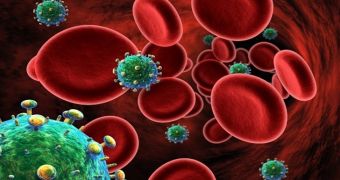In a paper published in yesterday's issue of the journal Proceedings of the National Academy of Sciences, researchers argue that it might be possible to eradicate HIV from a patient's body by causing it to mutate uncontrollably.
The idea is that, the more mutations this virus is made to undergo within a fairly limited amount of time, the weaker it will get. In time, the virus should die out on its own and disappear from a patient's body altogether.
As detailed by researcher John Essigmann with the Massachusetts Institute of Technology and his colleagues at the University of Washington, this treatment option boils down to taking advantage of something HIV does on its own when in the human body.
Scientists say that, shortly after infecting one cell or another, this virus gets to work making copies of its genetic material. Of these copies, some are erroneous, meaning that the virus mutates ever so slightly. The idea is to push this process into overdrive.
Thus, it is believed that, given the right drug, it might be possible to get HIV to double its mutation rate. This is expected to cause the virus to lose its ability to successfully replicate its genetic material and eventually trigger population collapse.
As detailed in the journal Proceedings of the National Academy of Science, this treatment option would first and foremost serve to help patients in long-term remission, i.e. folks who still carry the virus in their body but who are not made sick by it.
“What we would hope is that over a long period of time on this type of therapy, a person would potentially have their latent pool mutated to the extent that it no longer causes active disease,” says Massachusetts Institute of Technology specialist John Essigman.
Until now, researchers have managed to employ accelerated mutation rates to eradicate HIV in cells grown in laboratory conditions. The technique was been tested as part of a 4-month clinical trial involving 32 volunteers, but this time the virus population survived the assault.
John Essignman and fellow researchers now wish to further work on the recipe for the drug used during the aforementioned clinical trial, i.e. a mutagenic compound dubbed KP1212 and developed by Koronis Pharmaceuticals, a company founded by the scientists themselves.
The specialists estimate that, should they figure out a way to get KP1212 to double the mutation rate of HIV, the drug has high chances to cause the virus population in a patient's body to collapse in about 2 years' time following treatment.

 14 DAY TRIAL //
14 DAY TRIAL //